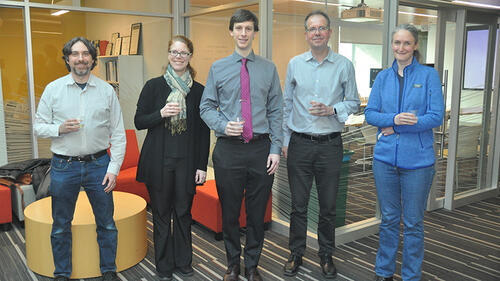
On January 9, 2023, London Cooper-Troendle successfully defended the thesis, “First Measurement of Inclusive Muon Neutrino Charged Current Triple Differential Cross Section on Argon” (advisor: Bonnie Fleming/Karsten Heeger).
Cooper-Troendle explained, “neutrino physics is entering an era of precision measurements. The upcoming DUNE and Hyper-K experiments aim to determine many of the remaining unknown neutrino parameters, including the mass hierarchy and degree of charge-parity violation. However, to accomplish this, accurate neutrino interaction models are required. This modeling is incredibly difficult, and relies on data – cross section measurements – to guide development. My dissertation is on the first measurement of the triple-differential inclusive muon neutrino charged current cross section on argon. This is especially exciting because of the neutrino energy dependence in the cross section measurement, as the neutrino energy is very important to oscillation experiments but is typically very difficult to accurately measure. We used the wealth of information available in MicroBooNE’s Liquid Argon Time Projection Chamber in combination with a new model validation procedure to give confidence in the accuracy of the measurement.”
Cooper-Troendle will next be working with Dr. Vittorio Paolone at the University of Pittsburgh on the ICARUS experiment, primarily on the development of event reconstruction algorithms, as well as cross section measurements using Wire-Cell on MicroBooNE.
Thesis abstract:
The field of accelerator neutrino experiments is entering an era of precision oscillation measurements where many of the remaining unknown neutrino measurements will be determined. The upcoming DUNE and Hyper-K experiments aim to determine the neutrino mass hierarchy and degree of Charge-Parity (CP) violation in the neutrino sector, providing potential insight on the matter-antimatter imbalance observed in the universe. However, these experiments require highly accurate measurements, and neutrino cross section modeling uncertainties may limit their capabilities. Cross section measurements at current- generation experiments can aid the development of neutrino interaction models to reduce these uncertainties. This is especially true for measurements of neutrino energy, as it drives neutrino oscillations and is of key importance to oscillation experiments.
The MicroBooNE experiment uses a Liquid Argon Time Projection Chamber (LArTPC) to produce neutrino-argon cross sections as one of its physics goals. The MicroBooNE detector’s fully active volume, precision reconstruction, and calorimetry information are leveraged in the Wire-Cell analysis to produce a muon neutrino selection that is 92% pure while maintaining 68% efficiency. A reconstruction chain featuring a fully 3D charge reconstruction and a graph-based particle trajectory fit are used to produce accurate measurements of lepton kinematics as well as visible hadronic energy produced in a neutrino interaction. This thesis presents the first neutrino-argon triple-differential cross section measurement, targeting inclusive charged-current final states. Wiener SVD unfolding is used to produce a measurement over neutrino energy, muon momentum, and muon scattering angle. A series of constrained goodness of fit tests are used to demonstrate the validity of MicroBooNE’s model in describing the distribution of reconstructed kinematics seen in data to ensure the accuracy of unfolding. The validated unfolding to neutrino energy represents a step forward in the field of neutrino cross sections, and demonstrates the capabilities of the LArTPC detector.